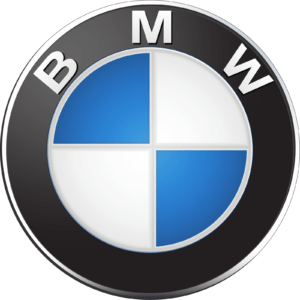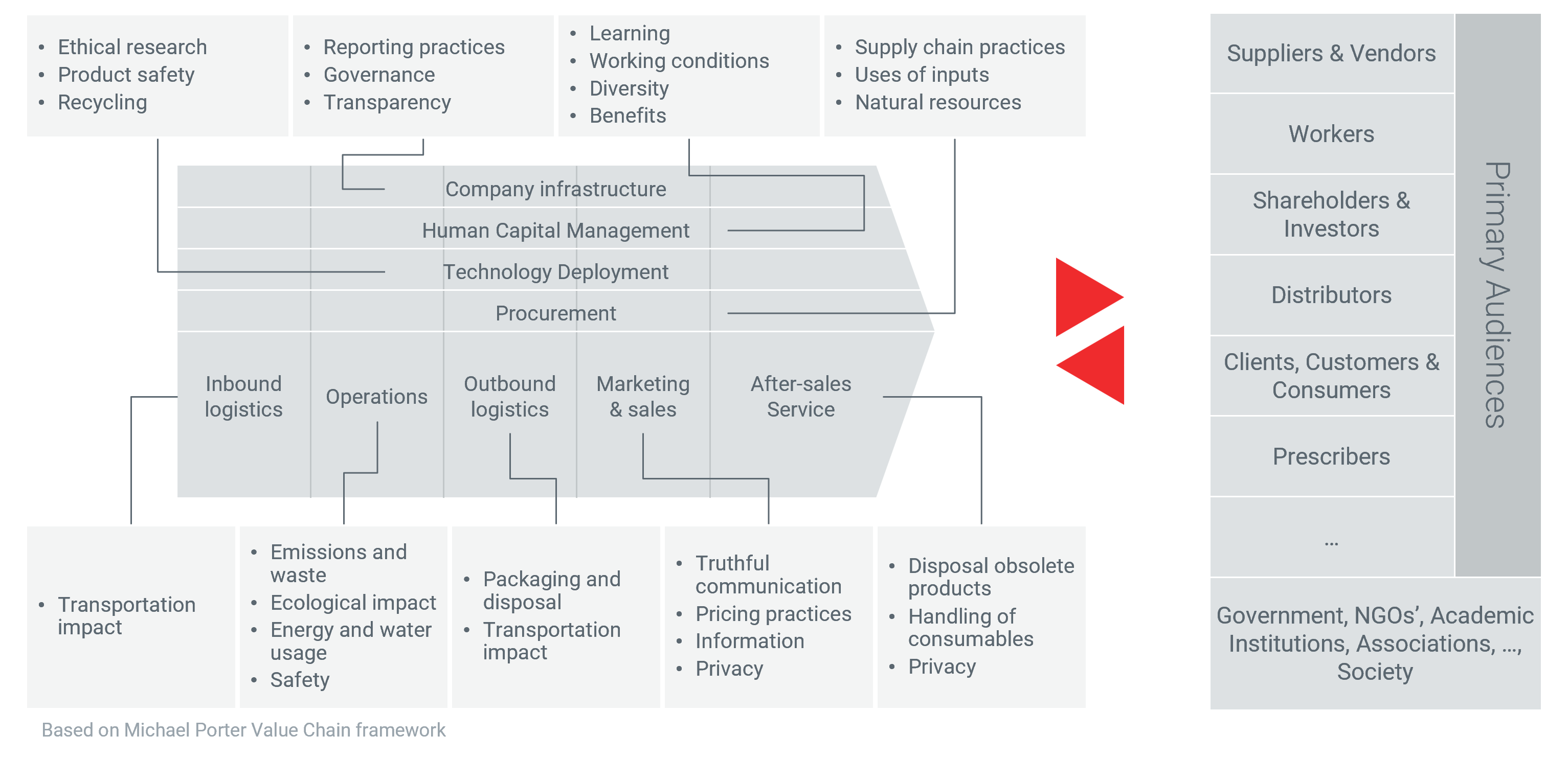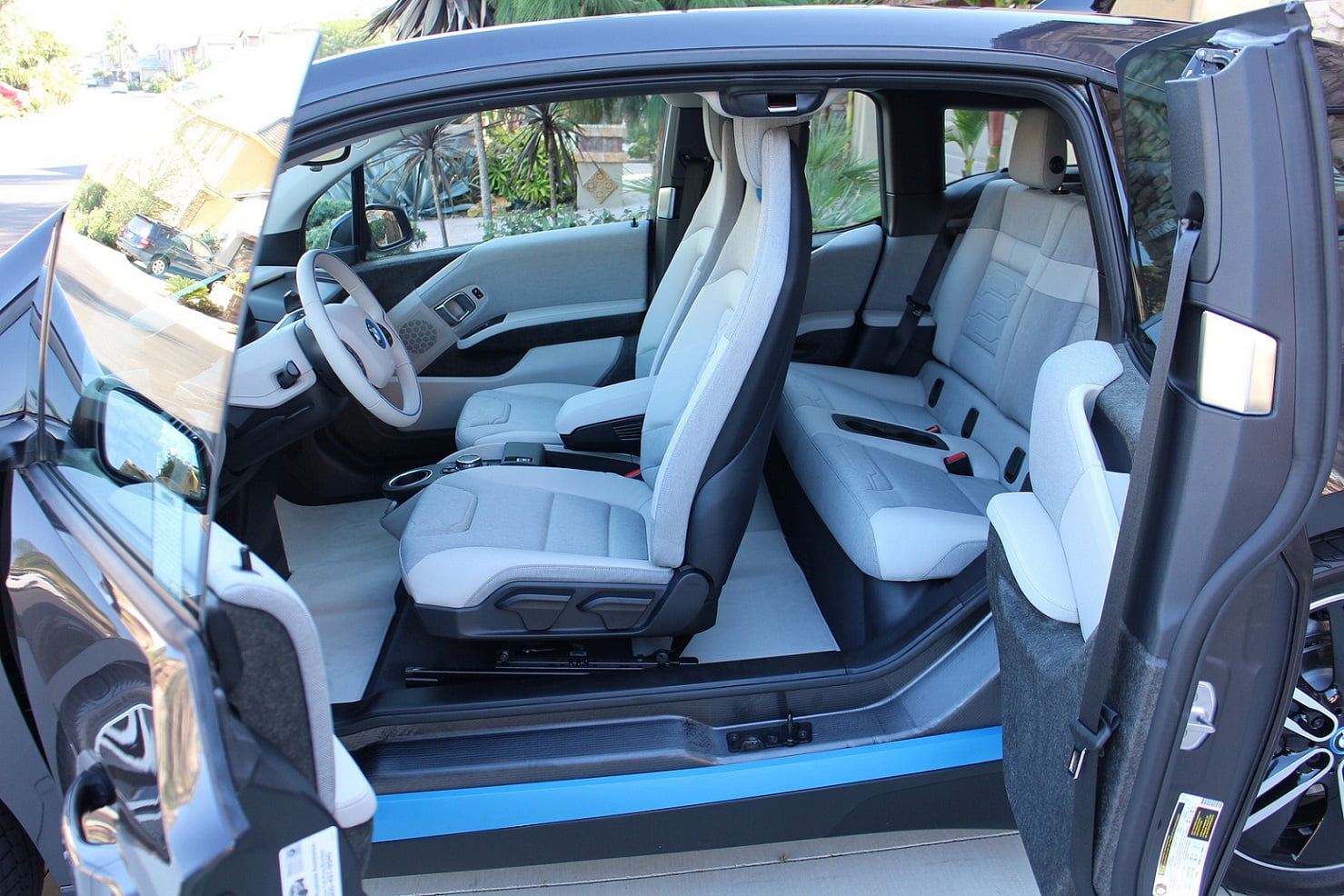By Lucia Böhles, Evan Müller, Leonardo Barbini and Louise Corneille | Bachelor in Management -BSc- Programme, ESCP Business School | Edited by Komoneed
BMW Sustainable Value Chain Analysis
BMW is a globally renowned luxury automobile manufacturer based in Germany. BMW is present in more than 150 countries and provides a variety of automobiles, including sedans, SUVs, and motorbikes. The company’s well-known emblem, a circle with white and blue quadrants, evokes the colours of the Bavarian flag and signifies the company’s origins in Germany’s Bavaria.

The company has also made great advancements in the creation of hybrid and electric cars, with the i3 and i8 leading the way in the direction of environmentally friendly transportation.
Overall, BMW has maintained a significant position in the automobile sector and generates yearly revenues of over $100 billion thanks to its commitment to quality, innovation, and luxury. As a result, it continues to be a highly regarded and desired brand among drivers and vehicle fans throughout the world.
The Value Chain

Infrastructure
The organizational Infrastructure at BMW is rather complex due to the immense size of the company and its operations.
Human Resources Management
BMW is dedicated to promoting equality and diversity in the workplace. The business has put in place several initiatives and programs to encourage diversity and inclusion, including diversity training, employee resource groups, and mentorship programs.
In terms of working conditions, BMW is dedicated to giving its employees a safe and healthy workplace. To guarantee the health and safety of its workers, the firm has put in place several safety and health measures, including frequent safety training and inspections.
BMW does not permit any form of forced labour, including child labour, in any of its commercial operations.
Technology Development
BMW is generally considered to have a strong reputation for ethical business practices within the DACH market, including in the areas of product quality and recycling. The company has implemented several recycling initiatives. Some examples include:
- Use of recycled materials: BMW uses recycled materials in the production of its vehicles. For example, the company uses recycled plastics in the production of some of its vehicle parts, such as door panels and seat
- End-of-life vehicle recycling: BMW has a recycling program for end-of-life vehicles, which aims to recover and recycle as much of the vehicle as possible. This includes recycling the vehicle’s metal, plastic, and glass components, as well as recovering valuable materials such as precious
- Energy recovery: BMW utilizes the energy generated by the recycling process in the production of heat and electricity in the recycling
- Battery recycling: BMW has been investing in the development of electric vehicles and has implemented recycling initiatives for the batteries used in these vehicles. For example, BMW has developed a recycling process that can recover valuable metals such as cobalt, nickel, and lithium from used battery
- Emissions reducing: BMW has implemented initiatives to reduce the emissions from its production facilities, such as investing in renewable energy and energy efficiency measures, which also helps in reducing the carbon
These recycling initiatives are part of BMW’s overall sustainability strategy, which aims to reduce the environmental impact of its operations and promote sustainable practices throughout the company.
Procurement
Depending on the particular material in issue, BMW obtains raw materials from a range of vendors all around the world. To make sure that suppliers adhere to the firm’s requirements for quality, environmental protection, and social responsibility, the company has a thorough procurement procedure that includes a supplier assessment system. Regarding crucial raw minerals like cobalt and lithium, which are needed to make the batteries for electric vehicles, the company has put in place a responsible sourcing policy.
The list of suppliers is not, however, made public by BMW since it would be viewed as sensitive commercial information that rivals could use. A comprehensive list could be difficult to offer due to the vast number of vendors.
Inbound Logistics
BMW uses a variety of transportation suppliers to move its products and raw materials around within the DACH market. These suppliers include shipping companies, trucking companies, and logistics providers.
Operations
Due to the manufacturing and usage of its automobiles, BMW, like many other automakers, has a substantial environmental effect on the DACH market. The firm significantly affects resource depletion, climate change, and air quality:
- Air pollution may be BMW’s franchisees’ biggest environmental The latest BMW model emits 127–129g/km of CO2 and 137–145g/km for sporty variants.
- In addition, a significant source of greenhouse gas emissions that contribute to climate change and global warming is the manufacture and usage of cars. BMW has set goals to lower CO2 emissions, but the company’s cars still have an environmental
- The extraction of enormous quantities of raw materials from the earth, such as metals, plastics, and rubber, for the manufacture of automobiles leads to the depletion of natural resources like fossil
BMW has made a variety of environmental steps to mitigate these effects, including investing in renewable energy sources, manufacturing more fuel-efficient and electric cars, and recycling materials.
Outbound Logistics
A sizable percentage of BMW’s carbon footprint is attributable to the logistics and transportation methods used to move goods and products throughout the DACH market, including shipping, trucking, and rail transportation.
However, it is challenging to give precise figures for the environmental impact of BMW’s packaging transportation because it depends on a variety of elements, including the specific routes and modes of transportation used, the amount of cargo transported, and the effectiveness of the company’s logistics operations.
Marketing and Sales
Like many other luxury automobile manufacturers, BMW utilizes several advertising techniques to advertise its goods and increase brand recognition in the DACH market.
Television and print advertising, which includes commercials and print ads in magazines and newspapers, are BMW’s two primary advertising tactics. BMW has also increasingly been utilizing digital marketing, including display advertising, search engine marketing, and social media advertising. BMW promotes its brand and automobiles through events, sponsorships, and partnerships.
Yet, because it encourages a culture of materialism and automobile dependence, automotive advertising also has a detrimental effect on the environment. Additionally, the production and distribution of these advertisements consume resources and generate waste, and the advertisement itself can be misleading or fail to inform consumers about the environmental impact of car ownership.
Service
A thorough training program is in place for BMW’s customer service employees since the company places a high value on offering great customer service.
The BMW training program emphasizes on improving the communication, problem-solving, and sales abilities of its customer service employees in addition to their product expertise.
Detailed Articles
- Environmental Impact of BMW, Mercedes-Benz, and VW in DACH
- BMW Sustainable Value Chain Analysis
- Mercedes-Benz Sustainable Value Chain Analysis
- Volkswagen Group Sustainable Value Chain Analysis
Sources
- BMW-Group-Lobbying-Policy-March-2021.pdf (bmwgroup.com)
- BMW Leadership and BMW Organizational Infrastructure – Research-Methodology
- More sustainable logistics at the BMW Group
- Sustainability | Volkswagen Group (volkswagen-group.com)
- VW Group Homepage
- From mine to factory: Volkswagen makes supply chain transparent with blockchain | Volkswagen Newsroom
- Intelligent supply and transportation control at the VW Group (eurolog.com)
- Human rights in the supply chain | Mercedes-Benz Group > Sustainability > Human rights > Supply Chain
- Sustainable supply chain management at Daimler | Mercedes-Benz Group
- Mercedes-Benz Launches Sustainable Supply Chain Initiative for EV Battery Sourcing – ESG Today
- Mercedes-Benz AG and Hydro partner for sustainable aluminium supply chain – Just Auto (just-auto.com)
Images
- Moerschy in Pixabay
- Rezaqorbani in Pixabay
- Daniel Andraski in Pexel
- Cottonbro Studio in Pexel
- Andrea Piacquadio in Pexels





after reading this article on BMWs sustainable value chain analysis, Im seriously impressed! Their focus on infrastructure and human resources management is top-notch. Kudos to BMW for leading the way in sustainable practices!
after reading the article on BMWs sustainable value chain analysis, Im blown away! Who knew infrastructure and HR management could be so intriguing? #mindblown
I never knew BMW had such a fancy term for their supply chain. #fancylingo
Actually, fancy lingo is quite common in the business world. It helps professionals communicate efficiently. So, before you dismiss it, why not educate yourself about the intricacies of supply chain management? It might surprise you how vital it is for companies like BMW.
I hate to burst your bubble, but lets not get carried away with BMWs eco-friendly image. Have you seen their carbon emissions during production? Its not all sunshine and rainbows, my friend. #greenwashing
I couldnt agree more! BMWs commitment to sustainability is truly admirable. Its refreshing to see a luxury car brand take responsibility for their impact on the environment. #DrivingChange
Hey guys, did you catch that article on BMWs sustainable value chain analysis? Pretty impressive stuff, right? 🚗💪 #innovation
Who knew BMWs value chain could be so sustainable? Impressive stuff! 🌿🚗
I hate to burst your bubble, but lets not get too carried away with BMWs so-called sustainability. Sure, they might be making some efforts, but the reality is that the automobile industry as a whole still has a long way to go in terms of truly sustainable practices.
Who knew that human resources management could be so exciting? BMW, youve got my attention!
Wow, who knew BMWs value chain could be so sustainable? Impressive stuff, guys! 🌿🚗
Really? I find it hard to believe that BMWs value chain is sustainable. Ive seen reports of their involvement in unethical practices and environmental damage. Dont be fooled by their green facade. 🌍🤔
Wow, who knew BMWs value chain could be so sustainable? Impressive stuff!